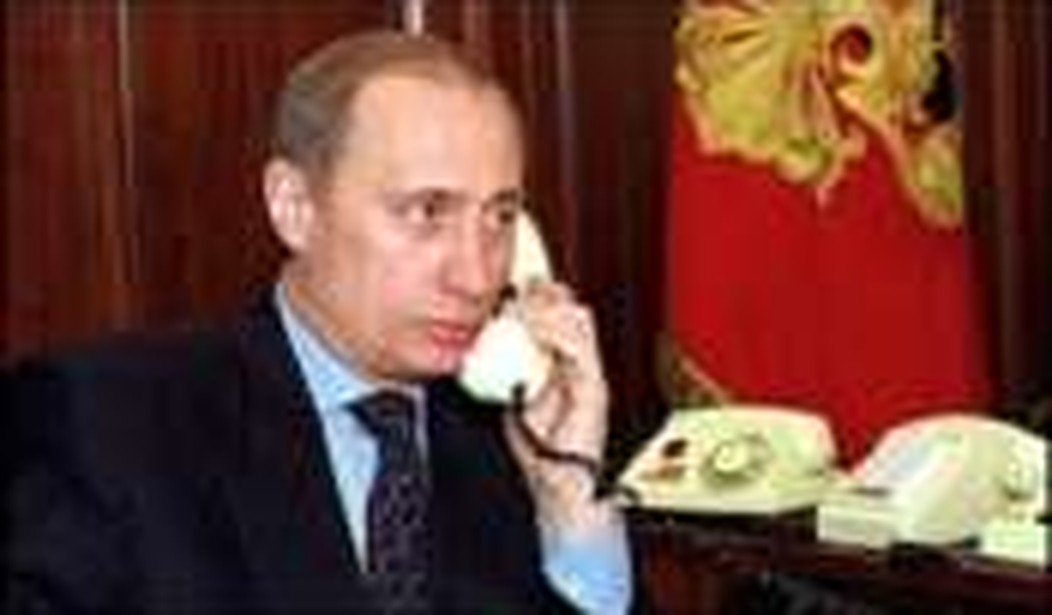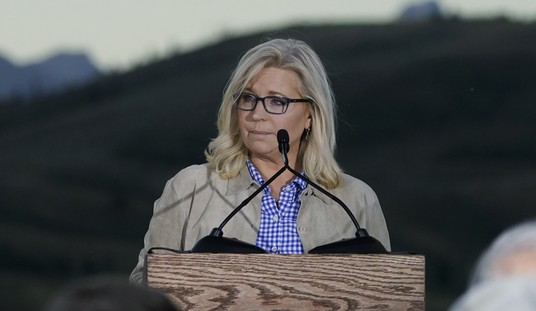Much has been said and written by his foes about how the foreign policy of U.S. President George W. Bush has alienated what should be a host of American allies in Europe. Recent elections in Britain, Germany and France, however, have produced national leaders who have been outspoken in expressing their American sympathies, and a recent survey shows that the world overwhelmingly still wants America to play a key role in world affairs.
What has not been noticed in all the fury of anti-Bushism is the extent to which Russia’s ruler, Vladimir Putin, has actually done what Bush is merely accused of doing — namely alienate the whole of Europe against him. A glaring oversight in Time magazine’s recent designation of Putin as “Person of the Year” (we’ve recently pointed out many others) was its failure to notice the perfect legal storm that is brewing above Putin’s head, as European courts place him squarely in their crosshairs.
European hostility to Putin is not merely rhetorical. In fact, public statements by European leaders are often conciliatory, such as when French President Nicolas Sarkozy telephoned Putin to congratulate him on his party’s victory in the recent parliamentary elections. But actions speak louder than words: Putin’s government is currently the target of a multiplicity of very serious legal actions in major European courts which could result in undermining his ability to govern.
This coming November, an arbitration proceeding will commence in The Hague, Netherlands, before a panel of three respected international jurists. At issue are claims against the Russian government for illegal nationalization of corporate assets, bilking foreign investors in the now-defunct YUKOS oil company to the tune of $100 billion. Understandably, they want their money back.
There are distinct echoes here of Al Capone, who was never “got” on any of his brutal murders and other crimes of violence but was ultimately apprehended and incarcerated on charges of income tax evasion. And the irony is rich indeed, for Putin himself used this “technicality” tactic to jail his leading rival, oil billionaire Mikhail Khodorkovsky — founder of YUKOS.
Under the 1994 Energy Charter Treaty, compensation must be paid to investors whenever a country’s energy assets are nationalized in a manner inconsistent with fundamental national law. Russia is a signatory to the treaty, and though it has not formally ratified the document the ECT contains provisions making it applicable to signatories.
And there’s more to it than that, because Russia couldn’t simply ignore this treaty regardless of any technical basis it might have for doing so. Russia signed the treaty in order to allow it to reap the rewards of foreign investment in its energy sector; without an expression of sympathy with the treaty’s basic principles, European money would simply have stayed away. The whole of Europe is party to the ECT (though the U.S. is not), and as the YUKOS investors (quoted by the Telegraph) have noted: “Russia does have a very good marketplace in Europe, but Europe is its only marketplace for oil and gas.”
Russia simply can’t afford to repudiate the legal basis for its dealings with Europe in the energy field, dealing that provide the basic working capital for the Kremlin’s continued existence. It could have simply ignored the hearings, but it’s contesting them as if it admitted that it is bound by the treaty.
Should Russia lose this case, the consequences would be dire. As the Telegraph reports:
And if the shareholders win on the merits as well as the jurisdiction point? “Then we will have to fight to enforce the award,” says Emmanuel Gaillard, the claimants’ lawyer and head of international arbitration at Shearman & Sterling. “We know it’s a long process.” How do you force a country like Russia to hand over hard cash? “They are a signatory to the New York convention, which is a treaty they have never denied being bound by,” adds Mr Osborne. “That entitles you to enforce international arbitration awards. If push comes to shove, we can go after any Russian state-controlled asset anywhere in the world that does not have sovereign immunity.”
And this is far from the only ominous legal proceeding that threatens to undermine the basic legitimacy of Vladimir Putin’s KGB-dominated regime. Khodorkovsky himself is challenging the legality of his conviction, allegedly for tax evasion, under international law in the European Court for human rights, and as we’ve previously reported has already scored one significant victory.
In October, the EHCR ruled that the Kremlin’s prosecution of Khodorkovsky’s right-hand man, Platon Lebedev, violated international human rights laws, and awarded him thousands of dollars in damages and legal fees. Khodorkovsky’s own case is still underway, and meanwhile the Kremlin is in the process of trying the oligarch a second time on new charges in order to keep him in prison indefinitely (otherwise, he’d already be out on parole).
So it’s entirely possible that within the next year or two the European courts will completely unravel the tidy little package into which the Kremlin had stuffed its chief political foe, calling the legitimacy of the Putin regime itself into serious question and giving Russia the international image of a banana republic. That’s to say nothing of having to shell out $100 billion in damages. Russia may be awash in oil proceeds, but a hundred billion here, a hundred billion there, and pretty soon we’re talking about real money. These results may come just as Putin settles in to some type of “president for life” status, which may even include re-incorporating the nation of Belarus, establishing what then could only be called a neo-Soviet Union.
And Russia’s legal problems in Europe do not stop there; indeed, encircled by aggressive legal actions, Russia begins to seem more and more like an isolated paper bear, rather than the resurgent world player described by Time. The ECHR has already found Russia guilty of state-sponsored murder in Chechnya, and in April of last year Georgia filed suit there alleging mass persecution of Georgians in Russia after Georgia claimed to have discovered a Russian-sponsored coup plot against Georgian President Mikheil Saakashvili and arrested four Russian military officers.
Currently, Georgia is considering a second suit, this one challenging Russian military incursions into its war-torn separatist province of Abkhazia. In December, the European Union strongly backed the Georgian government in its battle with street protesters it alleges were working with Russian interests to destabilize the government. Ukraine, too, has recently made noises about suing Russia, to compel disclosures regarding the cargo of Russian ships than sank in the Black Sea in November. Suddenly, threats of lawsuits have genuine currency in foreign policy. And indeed, that may be a highly effective measure when aimed at a country whose stability depends on a flow of capital from Europe and which increasingly is establishing a large asset presence there, making it vulnerable to court-ordered enforcement mechanisms. Just days ago, a Dutch Court ordered that a new auction be held to liquidate the assets of a Dutch subsidiary of YUKOS called Yukos Finance, having previously ruled that the first auction was illegal because the Russian legal process against the YUKOS parent was not entitled to respect under Dutch law.
Voice of America reports: “In that earlier sale, arranged by the company’s liquidator in Russia, Yukos Finance was to be sold to the state-run Russian oil firm Rosneft for $302 million. The estimated value of Yukos Finance assets is about $2 billion.”
Realizing this, the Putin regime may become increasingly desperate, and this would explain the fervency with which it is seeking to exert control over all aspects of civil society. In light of the infamous poisoning of KGB defector Alexander Litvinenko and the increasingly proactive stance of the ECHR regarding Russia, it was perhaps not surprising when Luzius Wildhaber, former President of the ECHR, alleged early last year that he had been poisoned on a trip to Russia in October 2006. Nor can it raise many eyebrows to disclose that Russian politicians are determinedly blocking efforts to streamline the ECHR’s work as it faces a backlog of cases generated by Russia (one-fifth of all matters the court handles are claims against the Russian government).
But here’s something that is surprising: In one of Putin’s boldest moves yet, he ordered the venerable British Council to shut down its benign cultural offices in Russia — an obvious act of retaliation for Britain’s dogged pursuit of Litvinenko’s killers, who have been traced back to the Kremlin itself. Britain’s response hardly indicated any intimidation at the hands of a mighty world power. In a word it was: “Nuts.” It simply refused to close the offices, daring the Kremlin to move against them and create an international incident.
Major newspaper reports in Germany and the United States have pointed out the “Potemkin Village” nature of Russia’s military and economic leverage, exposing a fundamentally weak society that is scarcely capable of stark intimidation on the international scene, so Britain apparently felt secure in calling Russia’s bluff. These measures may be getting under Putin’s skin; he openly expressed consternation over the extent to which Western governments were willing to support the opposition parties in the recent parliamentary elections.
Another example is Georgia, where the pro-U.S. president was recently faced with a spate of street protests organized by Kremlin sympathizers and obviously designed to provoke a crackdown, alienating Western allies and destabilizing his government. But the president’s response was another surprise: So little concerned with Russia’s ability to dominate his national politics was he that, after a brief period of martial law to restore order, he simply called snap elections, and has now prevailed with an emphatic majority in a poll roundly praised as free and fair (unlike Russia’s leader, the Georgian president made no attempt to block foreign observers) despite massive efforts put forth by the Kremlin to unseat the president. In another stunning instance of growing Russian impotence, the mission of the Commonwealth of Independent States, Russia’s attempt at a Warsaw-Pact-like structure for the post-Soviet world, ratified the Georgian elections as free of fraud even though Russia itself was stubbornly attacking them as rigged.
This doesn’t mean, of course, that Russia’s KGB-dominated regime isn’t capable of causing trouble; rather, it means that a window is open for the world to prevent that trouble now, rather than waiting for the situation to become more grave and perilous. The Kremlin is counting on Western inaction, and whether it is caused by a perception that Russia is to dangerous to mess with or to weak to worry about matters little to Russia’s rulers. What they want is time to consolidate, plan and grow — just as the Bolsheviks wanted a century ago, and got.
Kim Zigfeld is a New York City-based writer who blogs at the Pajamas Media Network blog Publius Pundit and publishes her own Russia specialty blog, La Russophobe. She also writes for Russia! magazine and is researching a book on the rise of dictatorship in Putin’s Russia.









Join the conversation as a VIP Member